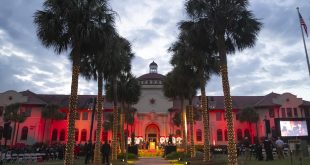Written by: Abbie Baggerly
Ah, the beach. Dr. Thomas Manning and his students will be there−but not to play.
Dr. Manning, a professor of chemistry at VSU, will travel with a group of students to the Florida Keys March 14-22.
The main purpose of the project is to try to produce a biodegradable material that will create a new marine ecosystem. The group will deploy two different materials and will monitor them to see which one creates a better reef.
“We want to see which material is the best for the growing of species like coral, clams and a host of invertebrates,” Dr. Manning said.
On Saturday, the group will remove the old reef material that has been placed and deploy the new material. The group will work with GoPro cameras, which were obtained with a grant, and ROVs (remote-operated vehicles) to keep the group updated during the night.
The ROVs are very handy in keeping the students updated but are very difficult to make.
“You have to do all the soldering; you have to get all the pipes and computer boards for it; you have to pick up the motors for it,” Tess Baker, senior biology major, said. “All the motors we had to make.”
Video will be taken using the GoPro cameras, which will allow the group to see what is going on.
The group will participate in a 24-hour lab, and every five to 10 minutes they will measure different parameters such as nitrate, phosphate, pH and dissolved oxygen.
The trip won’t be all work; students will be allowed to relax and visit sights such as the Hemingway House, Key West Aquarium, Mel Fisher Museum, Truman Little White House and the Keepers Quarters Museum.
Field work will be completed at Bahia Honda State Park, where the students will photograph some threatened and endangered species.
After all the research is completed, the students will present their marine conservation presentation. There will be seven students that present, and afterwards they will give out handmade sponge necklaces to those who answer questions correctly.
“Students will give a marine conservation presentation at the Key West Aquarium related to their reef work; that should last about three hours,” Dr. Manning said. “They give out about a hundred sponge necklaces that we make from real sponges from the Gulf.”
A grant has been given to the group that helps with the money for obtaining two different patents, and they are currently working on a third, which is an international patent.
“I really hope the reef takes off; I am really looking forward to putting it in and to further investigate the results,” Baker said.
 The Spectator The independent student newspaper of Valdosta State University
The Spectator The independent student newspaper of Valdosta State University





